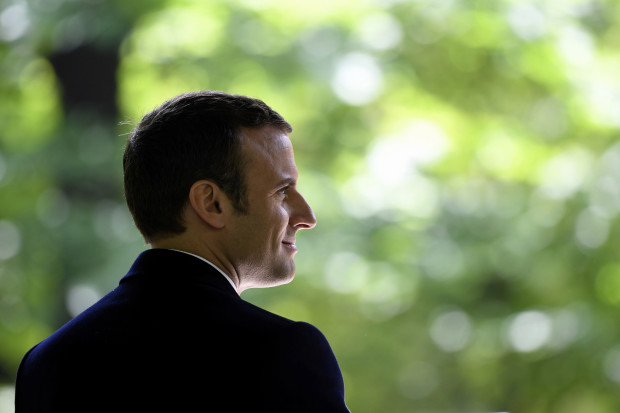France’s Macron faces first challenges ahead of swearing in

President-elect Emmanuel Macron attends a ceremony to mark the anniversary of the abolition of slavery Wednesday May 10, 2017 in Paris. (Eric Feferberg, Pool via AP)
Tensions over president-elect Emmanuel Macron’s bid to redraw France’s political map burst into the open Friday as a key ally was briefly angered ahead of crucial parliamentary elections next month.
Macron annoyed fellow centrist Francois Bayrou and faced mockery from his opponents after his La Republique En Marche (REM, Republic on the Move) party unveiled more than 400 candidates for crucial parliamentary elections in June.
“It’s a big recycling operation for the Socialist party,” Bayrou told L’Obs magazine, adding that candidates from his MoDem party had been offered only 35 constituencies instead of the 120 he expected.
Bayrou, a veteran centrist and presidential candidate, threw his support behind Macron at the end of February at a crucial time when the 39-year-old president-elect’s campaign needed new momentum.
“When I offered him my support, he was at 18 percent,” Bayrou added bitterly.
Article continues after this advertisementHowever, by Friday evening Bayrou announced a “solid and balanced” draft agreement had been reached with Macron’s party regarding the list of candidates, putting an end to 24 hours of tension.
Article continues after this advertisementMacron, who will be inaugurated on Sunday, has promised to refresh France’s parliament and his party unveiled 428 out of 577 candidates on Thursday.
Half of them have never held elected office, including a retired female bullfighter and a star mathematician, and half of them are women.
The initial reaction from three out of four voters was positive, a survey published Friday by the Harris Interactive polling group suggested.
“Probably the biggest success of Emmanuel Macron is having motivated so many people who were outside of politics to have committed themselves to try to renew things,” his spokesman Benjamin Griveaux said on Friday.
But as well as angering Bayrou, REM was forced to correct its list after around 10 people said they had not agreed to stand for the party or had never applied to be a candidate.
One was Mourad Boudjellal, the wealthy president of Toulon rugby club, who said that while he was flattered about being approached, “it is not my ambition” to enter politics.
The vice-president of the far-right National Front, Florian Philippot, accused Macron of “amateurism.”
PM pick to come
The parliamentary selection process is seen as a tricky and risky balancing act for Macron, who will take over from unpopular Socialist Francois Hollande.
Without his own parliamentary majority, the former investment banker will find it hard to push through his planned reforms of the labour market, pensions, unemployment benefits and education.
Macron, a former economy minister in Hollande’s government, has so far failed to attract centrist members of the rightwing Republicans party, but still believes some will cross over before he announces his final list next Wednesday.
Before then, he faces other crucial decisions on his staff at the Elysee Palace and his first government.
The most important will be his choice for prime minister, who will head the government until at least the parliamentary elections on June 11 and 18 and perhaps beyond.
Amid feverish speculation in the French media — will he pick a loyal supporter or someone from the rightwing Republicans? — nothing has leaked from his small group of aides.
The choice will send a strong signal about Macron’s intentions, and he has promised to pick someone with past experience of parliament and capable of managing a majority. His declared preference is for a woman.
Immediately after his swearing-in, Macron will head to Berlin to meet German Chancellor Angela Merkel to start discussions about his ambitious plans for reforming the European Union.
Macron wants to deepen integration in the 19-country eurozone, giving the zone its own budget, and wants to toughen the EU’s response to “unfair” industrial competition from countries such as China.
Once in office, the new president will have to decide how to press ahead with his controversial plans to loosen labour laws in France — the centrepiece of his effort to fight unemployment.
The country’s powerful trade unions and other leftwing opponents are expected to contest the move with mass demonstrations of the kind seen when Hollande tried to alter labour laws last year.
“The problem with promising change is that people always support it in general, but unfortunately then frequently disagree with it in particular,” former British prime minister Tony Blair wrote in Le Monde newspaper.
Blair, to whom Macron is frequently compared, gave the new French president advice, including picking his battles in the early part of his term and spending his political capital wisely.